News of the IPT
March 2024
Dr. Dr. Karin Ziegler won the Fritz Külz Preis at the 9th German Pharm-Tox Summit. The Fritz-Külz Prize is awarded every two years by the German Society for Experimental and Clinical Pharmacology and Toxicology (DGPT) and is the DGPT's highest award for young scientiests.
Sarah Hölzl won the poster prize at the 2024 Annual Meeting of the German Society of Pharmacology and Toxicology for her Poster on “Elucidating missing X factors to understand sex bias in cardiovascular disease”.
November 2023
Daniel Andergassen, an independent Junior Group Leader at the Institute of Pharmacology and Toxicology at TU Munich, has been awarded a prestigious Starting Grant from the European Research Council (ERC). This grant will support an ambitious research program focused on understanding the molecular mechanism behind sex differences observed in heart failure. A specific emphasis will be on genes that escape X chromosome inactivation in females, resulting in a higher gene dosage compared to males. This fundamental research will deepen our understanding of the molecular mechanisms underlying sex bias in heart failure and aims to develop RNA-based therapies for sex-specific treatments.
October 2023
Dr. Karin Ziegler won the August Wilhelm and Lieselotte Becht Forschungspreis 2023 for outstanding research work in the field of patient-oriented cardiovascular research at the DGK Herztage.
Official Text (link is external)
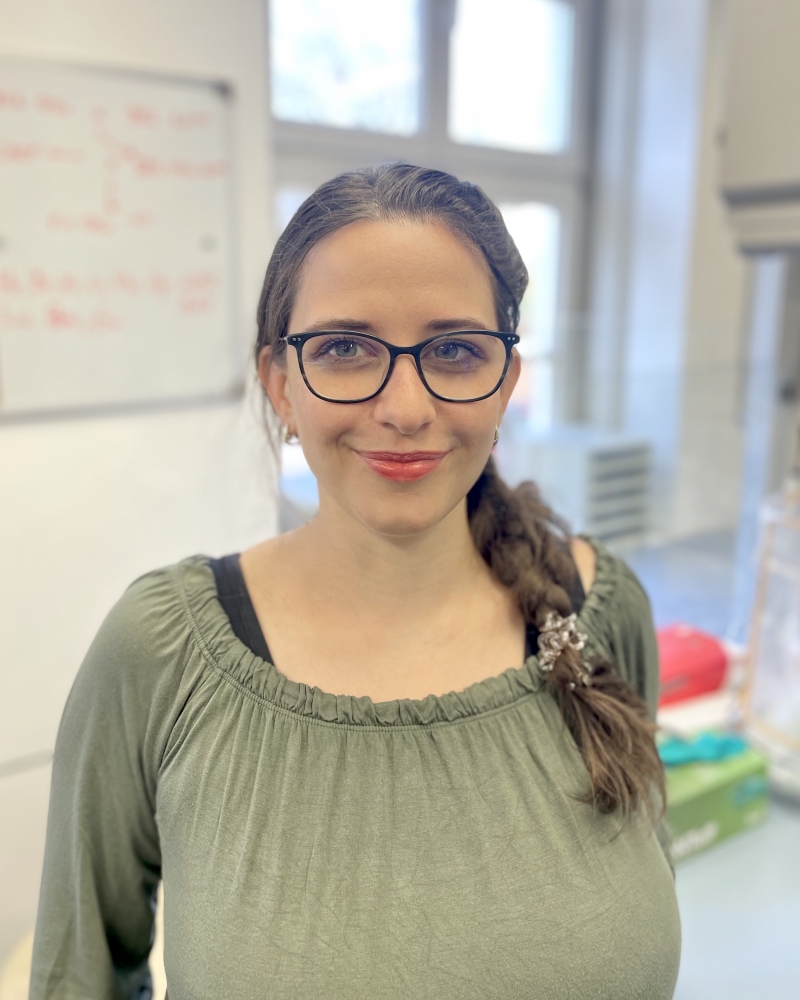
September 2023
Niklas Petzold won the Poster prize at the Young-DZHK retreat 2023 in Potsdam for his poster “Identification of key lncRNAs in cardiac resident macrophages using pooled CRISPR screens”.
July 2023
Trimannose-coupled antimiR-21 for macrophage-targeted inhalation treatment of acute inflammatory lung damage
Recent studies of severe acute inflammatory lung disease including COVID-19 identify macrophages to drive pulmonary hyperinflammation and long-term damage such as fibrosis. Here, we report on the development of a first-in-class, carbohydrate-coupled inhibitor of microRNA-21 (RCS-21), as a therapeutic means against pulmonary hyperinflammation and fibrosis. MicroRNA-21 is among the strongest upregulated microRNAs in human COVID-19 and in mice with acute inflammatory lung damage, and it is the strongest expressed microRNA in pulmonary macrophages. Chemical linkage of a microRNA-21 inhibitor to trimannose achieves rapid and specific delivery to macrophages upon inhalation in mice. RCS-21 reverses pathological activation of macrophages and prevents pulmonary dysfunction and fibrosis after acute lung damage in mice. In human lung tissue infected with SARS-CoV-2 ex vivo, RCS-21 effectively prevents the exaggerated inflammatory response. Our data imply trimannose-coupling for effective and selective delivery of inhaled oligonucleotides to pulmonary macrophages and report on a first mannose-coupled candidate therapeutic for COVID-19.
July 2023
Cause of sleep disturbance in cardiac disease identified
Immune-mediated denervation of the pineal gland underlies sleep disturbance in cardiac disease. Ziegler et al., 2023.
A team led by Professor Stefan Engelhardt, head of the Department of Pharmacology and Toxicology at the Technical University of Munich (TUM), and first author Karin A. Ziegler has now identified a direct consequence of sleep disorders in patients with cardiovascular disease.
Around one third of people with heart disease suffer from sleep problems. In a paper published in the journal Science, a team at the Technical University of Munich (TUM) shows that heart diseases affect the production of the sleep hormone melatonin in the pineal gland. The link between the two organs is a ganglion in the neck region. The study demonstrates a previously unknown role of ganglia and points to possible treatments.
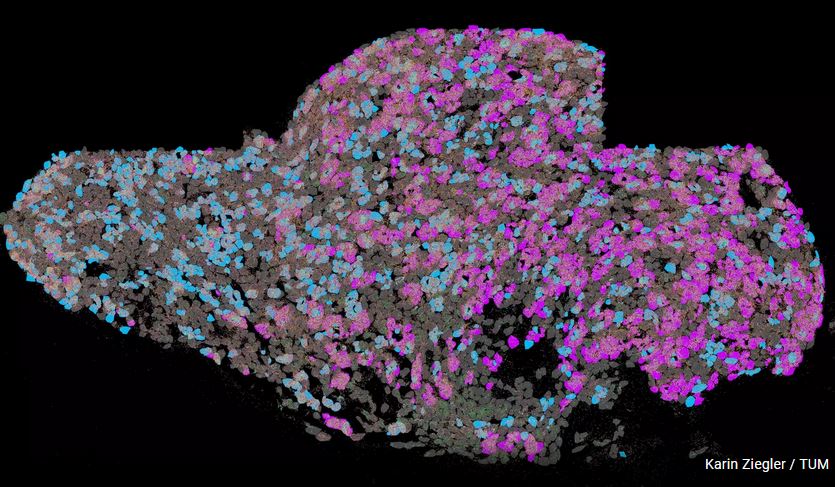
July 2022

New DZHK junior research group leader follows trail of "escaped" genes
Many diseases progress differently in women and men. There are often differences in the way they develop. This also applies to cardiovascular diseases. The reason for this is not yet clear. Dr. Daniel Andergassen suspects that part of the answer lies in the sex chromosomes. With his own junior research group, which is funded by the DZHK, he wants to pursue his assumption over the next six years at the Technical University of Munich (TUM).
For more information, click here. (link is external)
January 2022
Ministry promotes development of Covid-19 drug: A spray against lung damage in Corona
rnatics, a start-up at the Technical University of Munich (TUM), has developed an RNA-based agent to prevent inflammatory lung damage. These occur particularly in severe corona processes. The German Federal Ministry of Education and Research (BMBF) is supporting further development of the drug with around 7 million euros. The rnatics team is focusing on a substance that blocks proinflammatory microRNA.
For more information, click here. (link is external)
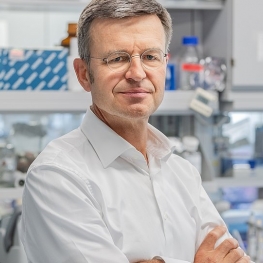
Epigenetic mechanisms for parent-specific genetic activation decoded - Unmuting the genome
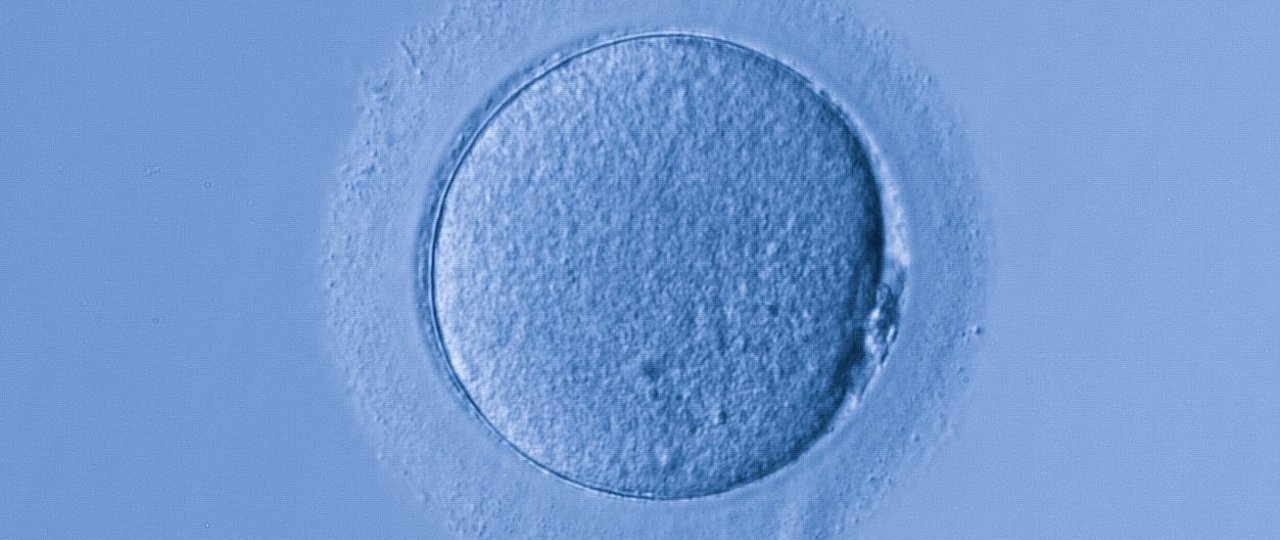
Hereditary diseases as well as cancers and cardiovascular diseases may be associated with a phenomenon known as genomic imprinting, in which only the maternally or paternally inherited gene is active. An international research team involving scientists at the Technical University of Munich (TUM), the Max Planck Institute for Molecular Genetics (MPIMG) in Berlin and Harvard University in Cambridge (USA) has now investigated the mechanisms responsible for the deactivation of the genes.
For more information, click here.(link is external)
A small RNA allows for therapeutic modulation of cardiac arrhythmias
Dena Esfandyari and colleagues discovered a crucial role of microRNA-365 (miR-365) in regulating human cardiac action potential. An abnormal cardiac action potential may lead to different types of life-threatening arrhythmias. This study suggests that miR-365 normalizes the pathologically altered action potential by modulating key cardiac repolarizing channels. These findings have been recently published in Nature Communications(link is external).

December 2021
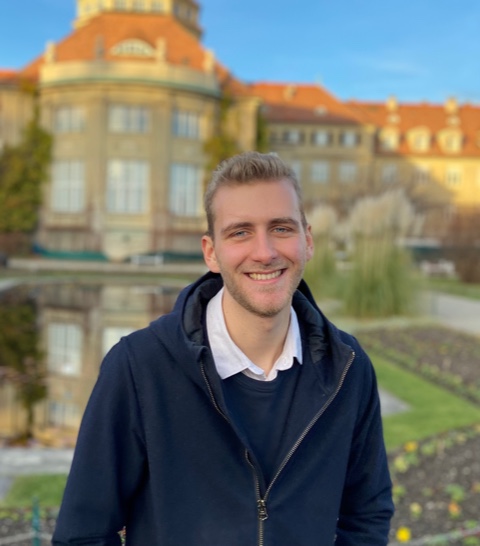
Otto-Hess scholarship for Sönke Michel
November 2021
SFB Project Retreat 2021 in Alpbach
From November 11th to 13th about 80 scientists from SFB TRR 267 were meeting in Alpbach for the annual project retreat. The impressive scenery fo the Alpbachtal created an ideal atmosphere for scientific exchange and networking within a variety of project presentations, poster sessions as well as the supporting framework program.
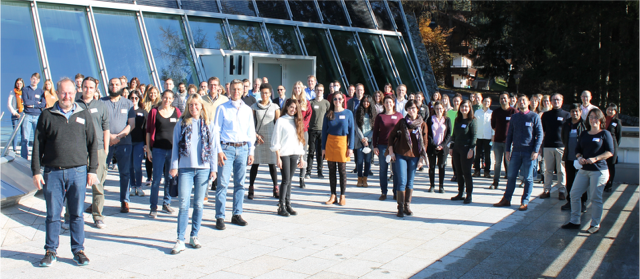
October 2021
Hans-Jürgen-Bretschneider-Abstract-Prize at the DGK Herztage 2021
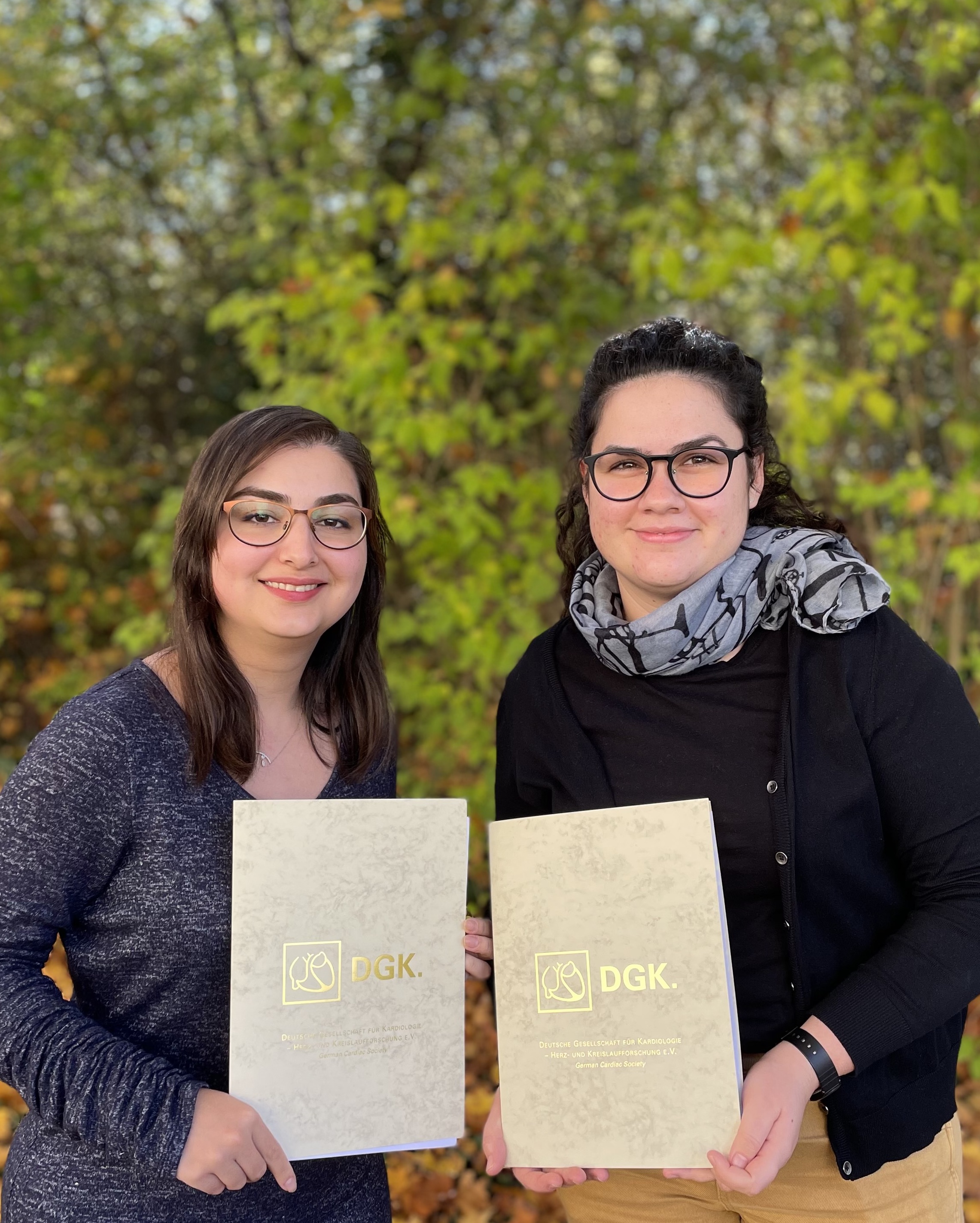
May 2021
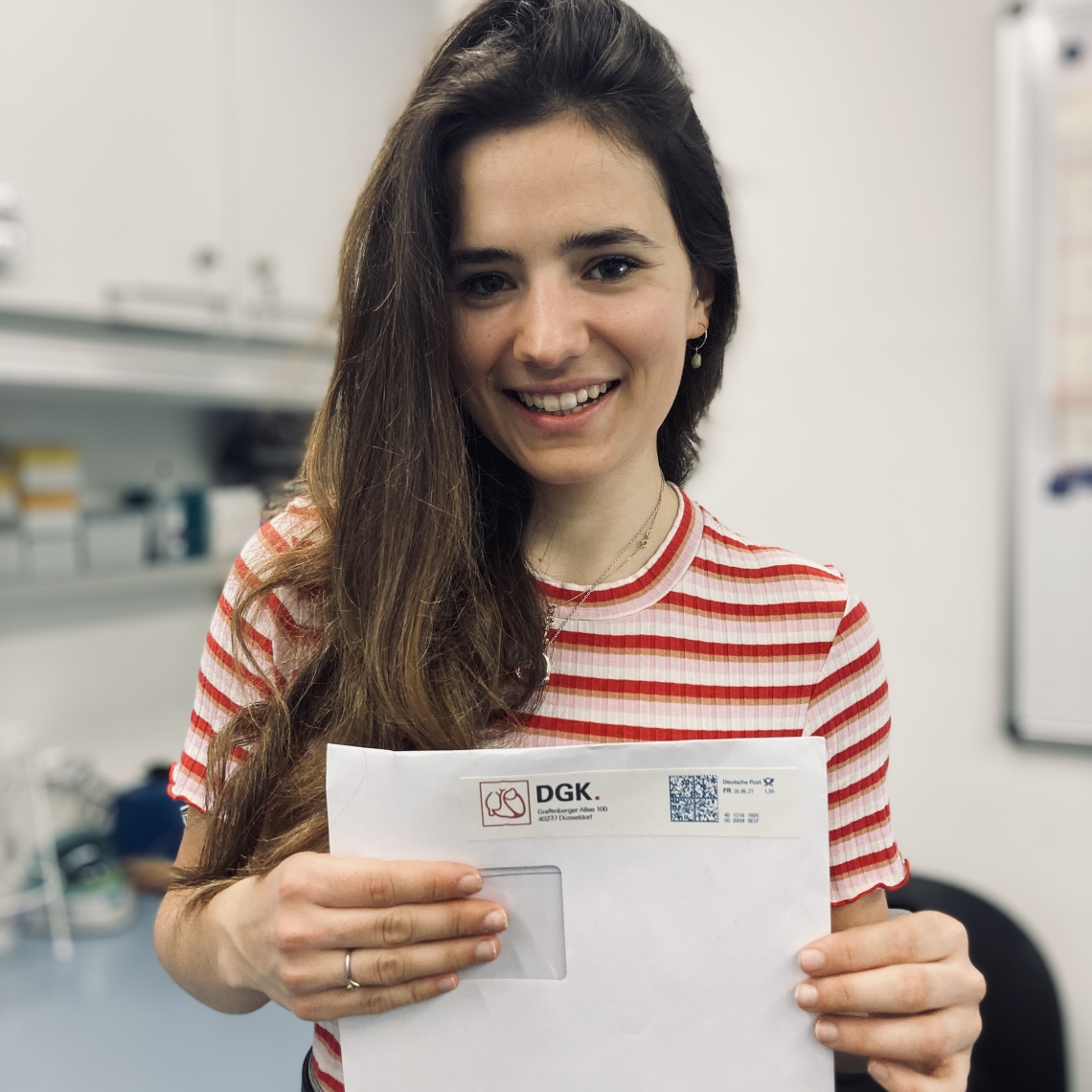
Otto-Hess scholarship for Luisa Gündel
The German society of cardiology (DGK) awarded Luisa Gündel the Otto-Hess scholarship for the execution of her MD thesis. The Otto-Hess scholarship supports excellent MD research projects.
March 2021
Poster prize at PharmTox Summit
Paula Vaccarello won the poster prize at the 2021 Annual Meeting of the German Society of Pharmacology and Toxicology for her Poster on "MicroRNA-21 as a potential therapeutic target in Idiopathic Pulmonary Fibrosis".
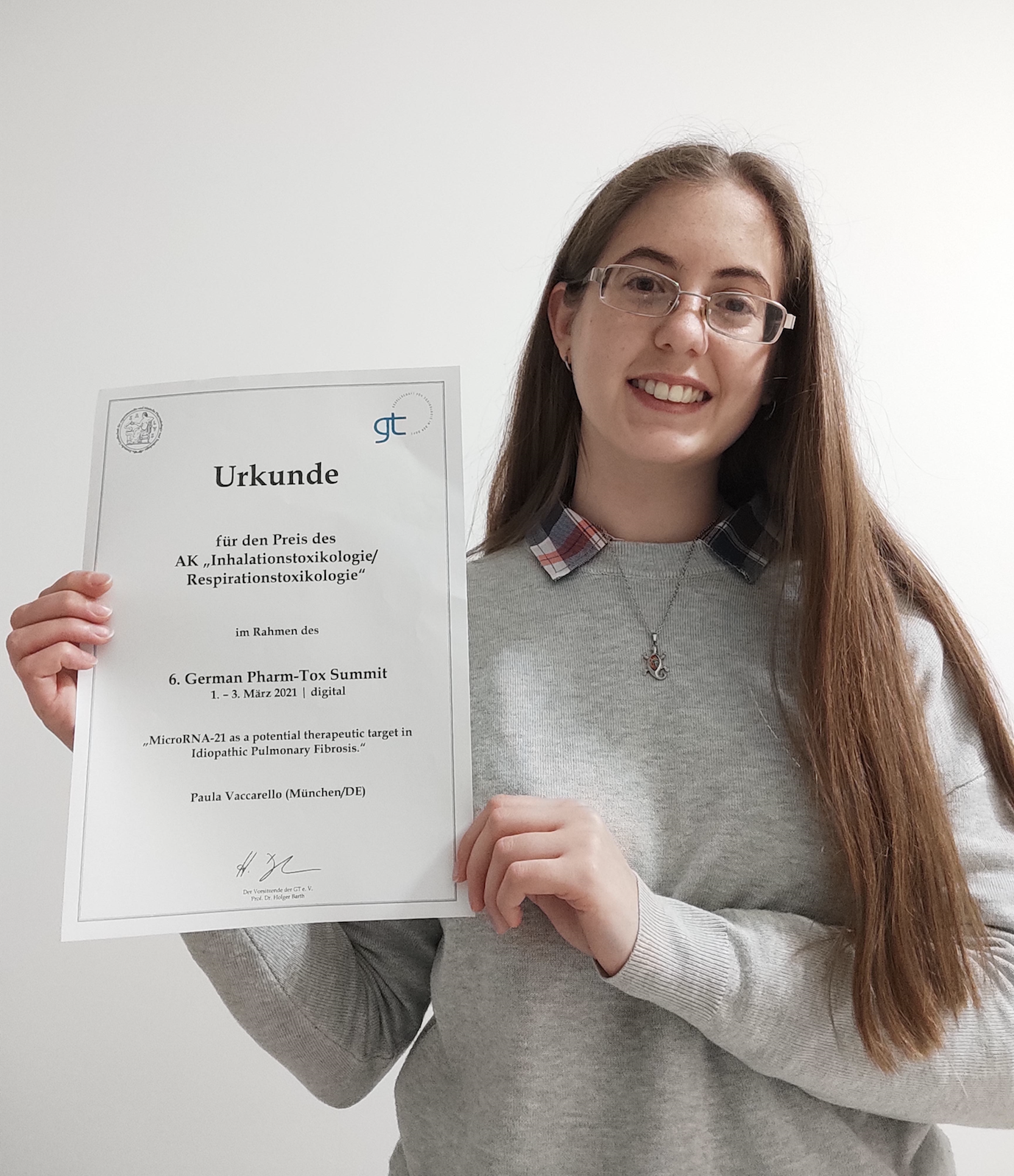
February 2021
A macrophage small RNA promotes cardiac fibrosis
Deepak Ramanujam and Anna Patricia Schön from the IPT have hitherto discovered a previously unknown molecular function of microRNA-21 (miR-21) that promotes fibrosis through its action in macrophages. This study suggests that macrophages hold promise as target cells for RNA-based therapy against miR-21. These findings have recently been published in the #1 Cardiovascular Journal Circulation(link is external).
October 2020
Bavarian Research Foundation funding for Covid-19 research: (link is external)
Inhalation spray agains pulmonary fibrosis after COVID-19
Patients who have had Covid-19 often suffer from reduced lung function for a long time afterwards. One cause of this is scarring of the lung tissue, known as pulmonary fibrosis. A small endogenous RNA molecule, microRNA, is suspected of driving this disease process. Synthetically produced inhibitors (anti-miR oligonucleotides) that neutralize microRNA would be a promising therapeutic strategy. However, when administered intravenously, the drug often does not reach the cells of the organ in question. In the case of the lung, the affected cells can be reached directly by inhalation.
The aim of the "Anti-miR against Pulmonary Fibrosis" project, headed by Stefan Engelhardt, Professor of Pharmacology and Toxicology at TUM, is to develop an inhalation method with the project partner Isar Bioscience GmbH, with which locally high drug concentrations can be achieved in the lungs. This should prevent the development of pulmonary fibrosis as a consequence of covid-19 disease.
April 2020
Next step towards RNA-based therapy of heart failure:
In a collaborative effort, Rabea Hinkel (MRI TUM) and Deepak Ramanujan from the IPT successfully demonstrated the efficacy of synthetic inhibitors of microRNA miR-21 in a pig model for myocardial ischemia. Recapitulating the situation in human patients where, after myocardial infarction, dysregulation of microRNAs contributes to pathologic cardiac hypertrophy and fibrosis, they showed that inhibition of miR-21 significantly ameliorates the phenotype. Their publication in JACC, entitled „AntimiR-21 Prevents Myocardial Dysfunction in a Pig Model of Ischemia/Reperfusion Injury“, was selected as the Paper of the Month by the German center for Cardiovascular Research (DZHK).
March 2020
Poster prize at PharmTox Summit
Christina Beck won a poster prize at the 2020 Annual Meeting of the German Society of Pharmacology and Toxicology for her Poster on "Inhibition of miR-21 mediates cardioprotection by preferential target regulation in non-myocytes".
October 2019
Otto-Hess poster prize
Congratulations to Anna Patricia Schön for receiving the 1st place of the Otto-Hess poster prize 2019 and to Christina Beck for winning the 1st place Hans-Jürgen-Bretschneider poster prize 2019 awarded by the Deutsche Gesellschaft für Kardiologie.

May 2019
The German Research Foundation funds research into molecular regulation in the cardiovascular system
The German Research foundation has approved funding for a new collaborative research center ("Sonderforschungsbereich", short "SFB") at the behest of the Technical University of Munich (TUM), Goethe University Frankfurt and other partners. Over the next four years, the 30-partner consortium will investigate the role of non-coding RNAs in the cardiovascular system and will receive funding around 11 million euros of this purpose.
www.tum.de/nc/en/about-tum/news/press-releases/details/35465/(link is external)
Otto-Hess scholarship for Paula Uibel
MD student Paula Uibel has been awarded the Otto-Hess scholarship for 2019. The Otto-Hess scholarship awarded by the Deutsche Gesellschaft für Herz- und Kreislaufforschung (DKG) supports excellent MD research projects
February 2019
Poster prize
Christina Beck won one out of three poster prizes at the 2019 Annual Meeting of the German Society of Pharmacology and Toxicology for her Poster on "Argonaute immunoprecipitation and RNA sequencing to identify the targets of microRNAs-21 and -29 in the mammalian heart"
January 2019
Chair of Pharmacology and Toxicology at Salzburg University for Antonio Sarikas
Antonio Sarikas, group leader at the IPT since 2009 has accepted an offer by the Medical University of Salzburg (Austria) as Chair of Pharmacology and Toxicology. He starts January 2019 and we are actively looking for a successor.
December 2018
DGK Stipend for Karin Ziegler
Karin Ziegler has been awarded the 2018 DGK stipend for her project on "Characerization of the symathetic control of cardiac immune cells".
November 2018
Congratulation to Anna Patricia Schön for receiving the Segnitz-Ackermann prize awarded by the Deutsche Stiftung für Herzforschung!
The award ceremony was at the DGK Basic science meeting in October 2018 in Berlin.
Quelle: "DGK/Stefan Erhard"
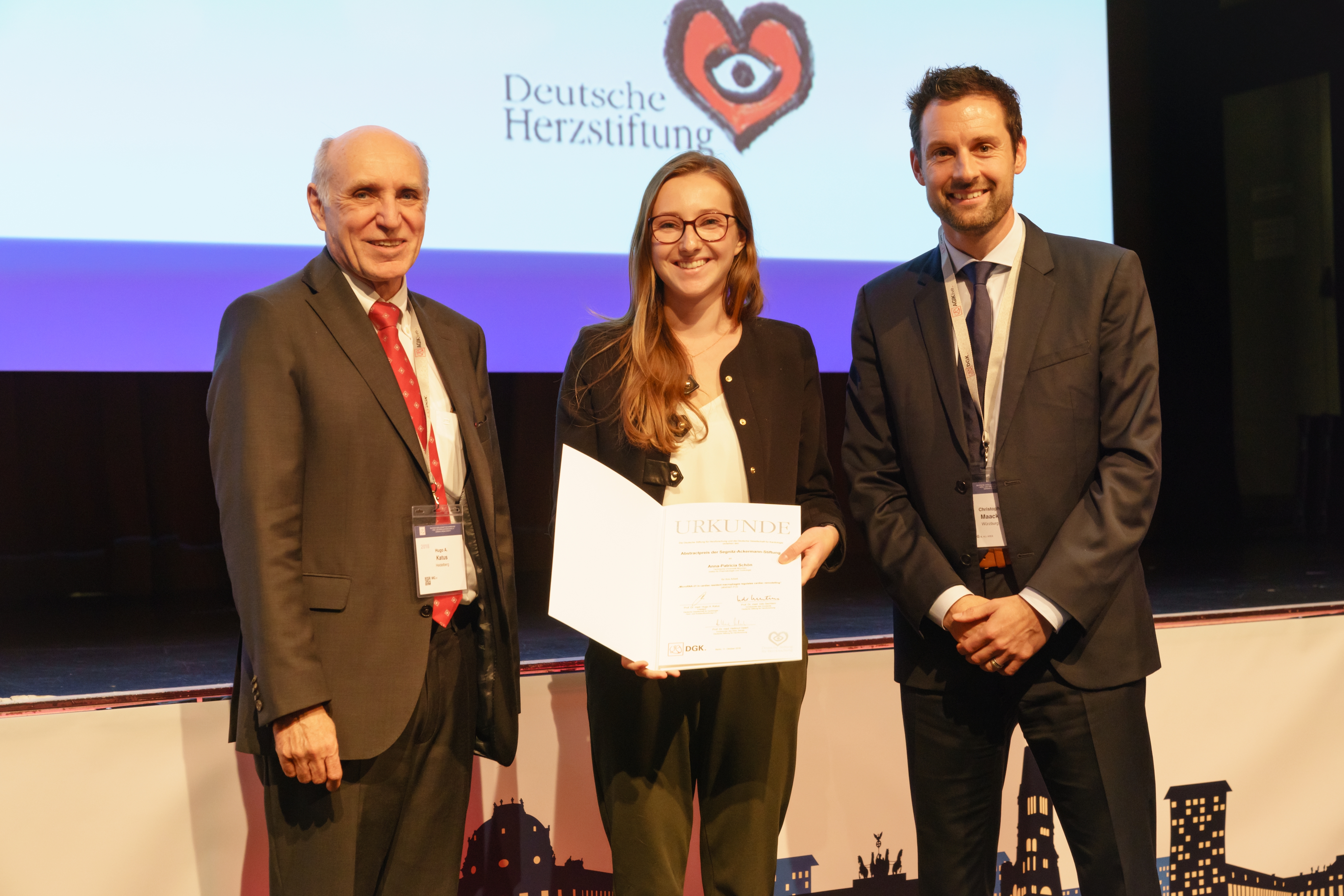
April 2017
Otto-Hess poster prize
Congrats to Karin Ziegler on winning the first place of the Otto-Hess-Poster prize! She received the award for the best poster presentation in the Otto-Hess-Poster session at the 83th annual meeting of the German Cardiac Society in Mannheim.
Quelle: "DGK/Thomas Hauss"

